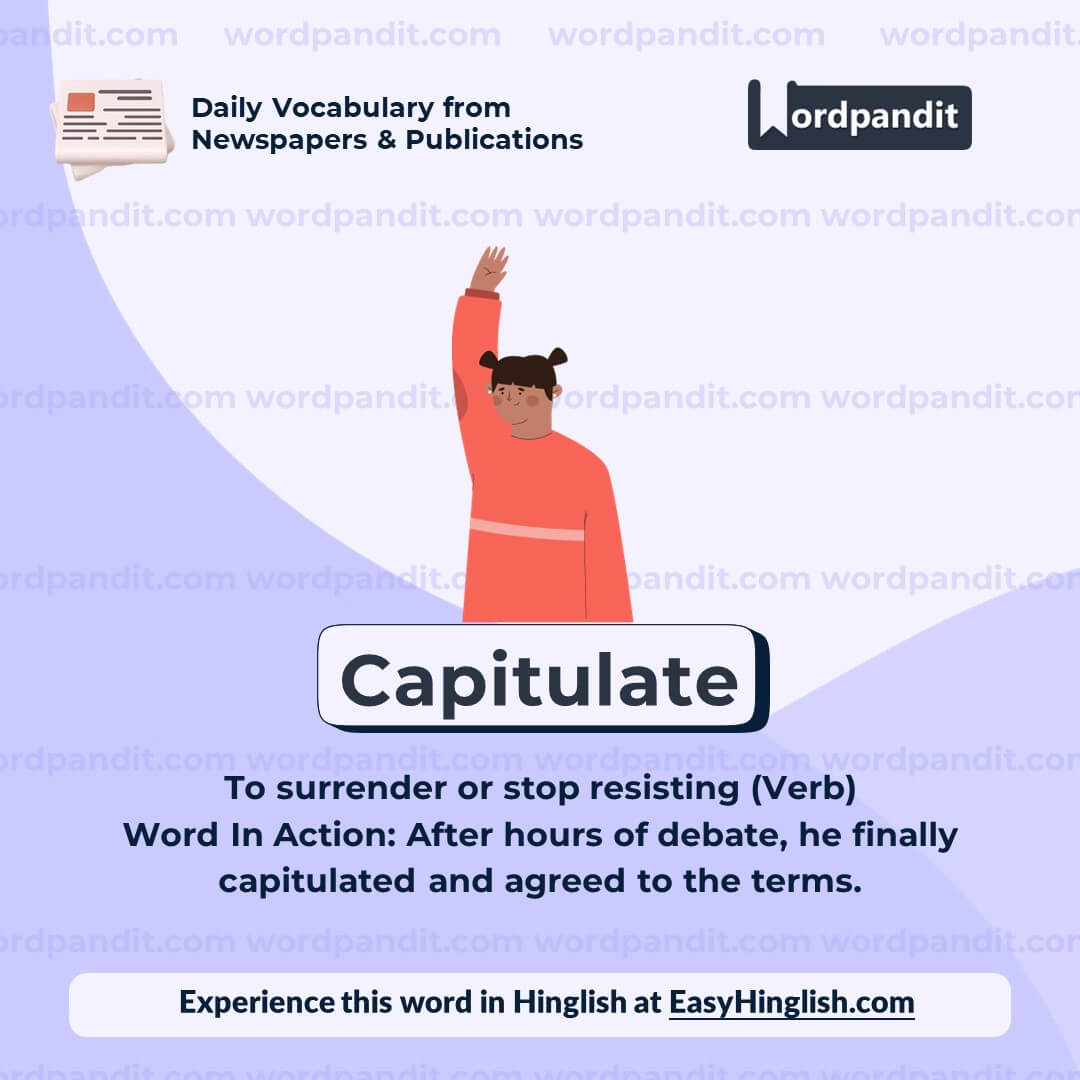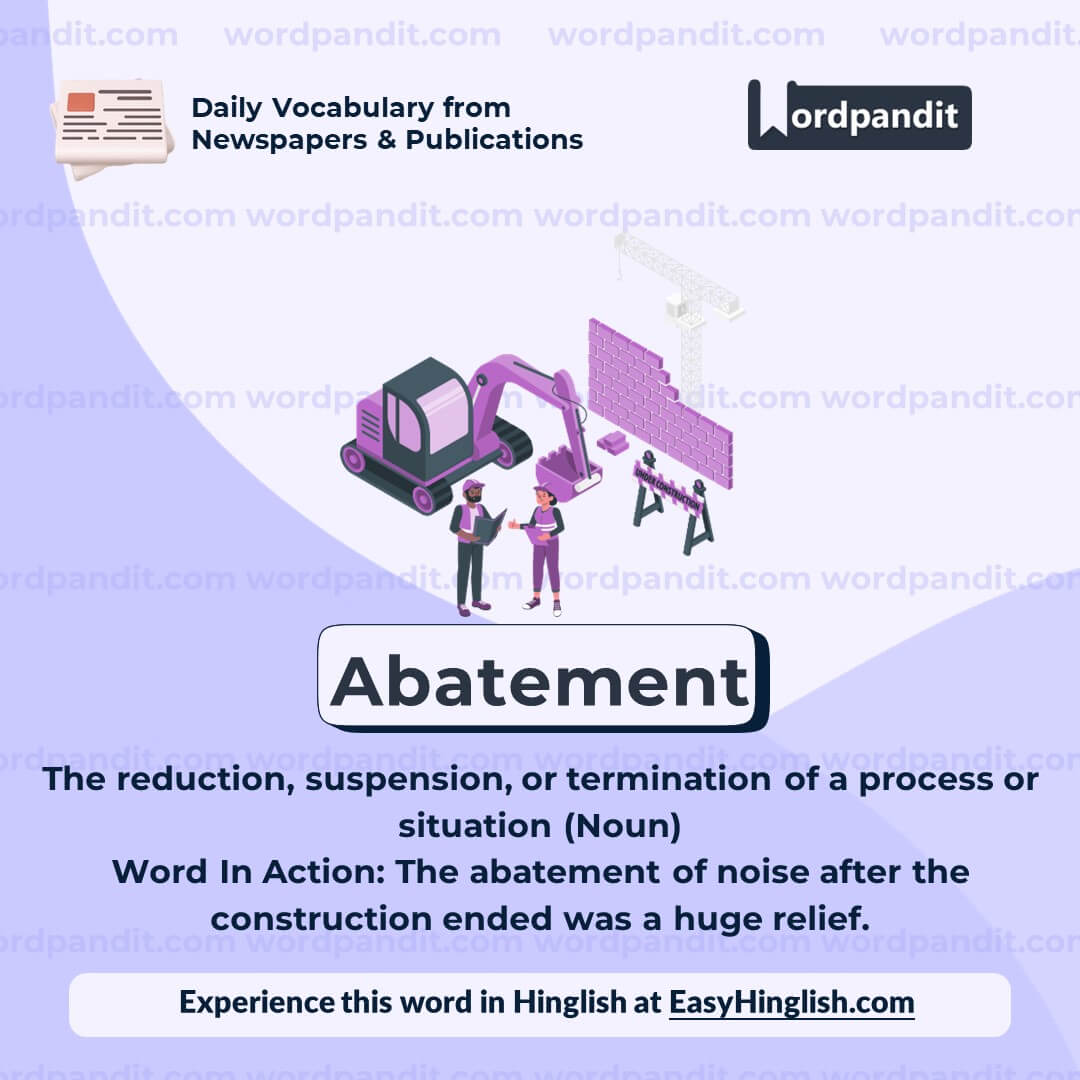Daily Vocabulary from Indian Newspapers and Publications
Welcome to Wordpandit’s Indian Vocabulary Hub
At Wordpandit, we understand the importance of staying rooted in the local context while expanding your language skills. This section focuses on enriching your vocabulary with words and phrases drawn from India’s leading newspapers and publications, ensuring you're learning vocabulary that is practical, relevant, and uniquely Indian.
Why Indian Sources Matter
We believe that the best way to master any language is by immersing yourself in local content. That’s why we carefully curate vocabulary from top Indian publications, including:
- The Hindu
- The Times of India
- The Economic Times
- Hindustan Times
- Live Mint
- The Indian Express
- And many others...
Stay Updated, Stay Relevant
With daily updates from Indian news sources, you’ll be consistently learning words that reflect the trends and shifts in Indian society and culture. Our focus is to provide vocabulary that enhances your understanding of the language in an Indian context.
How Wordpandit Supports Your Goals
Whether you’re preparing for exams, aiming to improve your professional communication, or simply want to stay connected with the latest Indian vocabulary, Wordpandit is here to guide you every step of the way.
Learn with a Practical Approach
Our interactive learning methodology includes real-world examples, engaging activities, and context-specific usage to ensure that every word becomes part of your active vocabulary.
Dive into Indian Vocabulary Today!
Why Choose Wordpandit?
Practical Learning: Focus on words you'll actually encounter in real-world reading, enhancing your comprehension and communication skills.
Diverse Content: From current affairs to scientific breakthroughs, our varied sources expose you to vocabulary across multiple domains.
Effortless Integration: Make Wordpandit a part of your daily routine. Just a few minutes each day can significantly boost your lexicon over time.
Your Path to Vocabulary Mastery
- Visit our Daily Vocabulary section regularly
- Explore new words and their usage in context
- Practice incorporating these words into your own writing and speech
- Track your progress as your vocabulary expands
Start Your Journey Today
Embark on your vocabulary enhancement journey with Wordpandit. By consistently engaging with our daily posts, you'll build a robust vocabulary that serves you well in academic, professional, and personal contexts.
Remember, a word a day keeps linguistic limitations at bay. Make Wordpandit your daily companion in the quest for vocabulary excellence!
WORD-1: Grunge
Context:
"Isolated on grunge background." - The Hindu
Explanatory Paragraph:
The word "grunge" originally referred to dirt or grime, but it became popular in the late 20th century to describe a specific subculture and musical movement. Grunge music, emerging from Seattle in the 1980s and 1990s, is characterized by its raw, distorted sound and lyrics reflecting social alienation. The term is also used in fashion and design, denoting a rugged, messy, or unpolished aesthetic.
Meaning: Dirt, grime, or an unpolished aesthetic; also a rock music genre (Noun)
Pronunciation: gruhnj
Difficulty Level: ⭐⭐⭐ Intermediate
Etymology: Originated in the 1960s from American slang, derived from "grungy," meaning dirty or messy.
Synonyms & Antonyms:
Synonyms: Dirt, grime, ruggedness, roughness
Antonyms: Cleanliness, neatness, refinement
Usage Examples:
- The grunge aesthetic in fashion features ripped jeans, flannel shirts, and unkempt hairstyles.
- Nirvana was one of the most iconic bands of the grunge music movement.
- She prefers a minimalist design over the rough and grunge look.
- The photographer used a grunge texture to add a vintage effect to the image.
Cultural Reference:
"Grunge music emerged from Seattle in the late 1980s, with bands like Nirvana, Pearl Jam, and Soundgarden defining the genre with their distorted guitar sounds and introspective lyrics." - Music History Archives
Think About It:
How do you think the grunge movement influenced modern music, fashion, and design?
Quick Activity:
Look at images of grunge fashion and design. Can you describe what makes them distinct? Try using the word "grunge" in a sentence.
Memory Tip:
Think of "grunge" as a mix of "grimy" and "rough." If something looks old, worn-out, or unpolished, it likely has a grunge style.
Real-World Application:
The grunge aesthetic is widely used in graphic design, fashion, and music, influencing album covers, website themes, and clothing styles.
WORD-2: Swell
Context:
"The stampede was preceded by swell in crowd of passengers waiting to board trains for Prayagraj where the Maha Kumbh is underway on platform number 14 and 15 of the station." - The Hindu
Explanatory Paragraph:
The word "swell" can refer to an increase in size, volume, or intensity. It is often used to describe physical expansion, as in swelling due to injury, but it can also be applied metaphorically to things like crowds, emotions, or waves. In the given context, "swell" refers to the rapid increase in the number of people waiting at the platform.
Meaning: To increase in size, volume, or number (Verb); A gradual increase (Noun)
Pronunciation: swel
Difficulty Level: ⭐⭐⭐ Intermediate
Etymology: Derived from Old English "swellan," meaning "to grow or increase in size."
Synonyms & Antonyms:
Synonyms: Increase, expand, grow, surge, amplify
Antonyms: Shrink, reduce, contract, decline
Usage Examples:
- The river swelled after heavy rainfall, causing floods in the nearby villages.
- His pride swelled as he received the award for his outstanding performance.
- During the holiday season, there is always a swell in the number of shoppers at the mall.
- Her ankle swelled up after she twisted it during the game.
Cultural Reference:
"Swell" was a popular slang word in the early 20th century, especially in American English, meaning "great" or "fantastic." It was frequently used in classic Hollywood films and old-fashioned conversations.
Think About It:
How does the concept of "swell" apply to both physical and metaphorical situations in daily life?
Quick Activity:
Think of a situation where you’ve seen a "swell" in numbers—whether in traffic, a classroom, or a public event. Write a sentence using "swell" in that context.
Memory Tip:
Remember "swell" by thinking of a balloon—when you blow air into it, it swells or grows larger.
Real-World Application:
"Swell" is commonly used in news reports, weather forecasts, and medical discussions, such as describing a swelling injury or an increase in population.
WORD-3: Capitulate
Context:
"The company capitulated to the labor union to avoid a strike." - The Hindu
Explanatory Paragraph:
The word "capitulate" means to surrender or give in after resistance. It is often used in the context of negotiations, conflicts, or battles when one side finally agrees to the demands of another. In the given context, the company "capitulated" to the labor union, meaning it agreed to the union’s demands to prevent a strike.
Meaning: To surrender or stop resisting (Verb)
Pronunciation: kuh-PICH-uh-layt
Difficulty Level: ⭐⭐⭐⭐ Advanced
Etymology: From Latin "capitulare," meaning "to draw up under headings" or "to arrange terms of surrender."
Synonyms & Antonyms:
Synonyms: Surrender, yield, submit, concede, give in
Antonyms: Resist, defy, oppose, endure
Usage Examples:
- After months of pressure, the government capitulated and agreed to lower taxes.
- The army refused to capitulate, even though they were heavily outnumbered.
- Faced with overwhelming evidence, the defendant finally capitulated and pleaded guilty.
- The negotiation was tough, but in the end, the supplier capitulated to the new pricing demands.
Cultural Reference:
During World War II, many countries were forced to capitulate to invading forces after prolonged resistance. One of the most famous examples is France’s capitulation to Germany in 1940.
Think About It:
Is capitulating always a sign of weakness, or can it sometimes be a smart strategic decision?
Quick Activity:
Think of a historical or fictional situation where one side capitulated. Can you describe the reasons behind their surrender?
Memory Tip:
Think of "capitulate" as similar to "capture"—when someone is captured, they often have no choice but to surrender.
Real-World Application:
The word "capitulate" is frequently used in business, politics, and war to describe situations where one party concedes to another after resistance.
WORD-4: Condoled
Context:
"Jammu and Kashmir LT Governor Manoj Sinha and Chief Minister Omar Abdullah condoled the death of 18 people in a stampede at New Delhi Railway station." - The Hindu
Explanatory Paragraph:
The word "condoled" refers to expressing sympathy or sorrow, especially for someone who has suffered a loss. It is often used in the context of offering condolences after a tragedy, death, or unfortunate event. Public figures and leaders frequently extend their condolences to show support and empathy for those affected.
Meaning: Expressed sympathy or sorrow for someone’s loss (Verb)
Pronunciation: kun-DOLED
Difficulty Level: ⭐⭐ (Easy to Intermediate)
Etymology: Derived from the Latin word "condolere," which means "to suffer together," from "con-" (together) and "dolere" (to grieve or suffer).
Synonyms & Antonyms:
Synonyms: sympathized, lamented, mourned, expressed sorrow
Antonyms: disregarded, ignored, neglected
Usage Examples:
- The President condoled the families of the soldiers who lost their lives in the accident.
- After hearing the sad news, she condoled with her friend over the phone.
- The community gathered to condole the victims of the tragic earthquake.
- He condoled the loss of his colleague’s father with heartfelt words.
Cultural Reference:
"Condolences" is a term often used in obituaries, funeral ceremonies, and official statements. In many cultures, expressing condolences is a significant social gesture to show support and solidarity with the bereaved families.
Think About It:
Why do you think offering condolences is important in maintaining social harmony and emotional well-being?
Quick Activity:
Write a short condolence message that you would send to a friend who has lost a loved one.
Memory Tip:
Think of "condole" as "console"—both words relate to offering comfort in difficult times.
Real-World Application:
In professional and social settings, knowing how to express condolences appropriately is a valuable skill. Whether in person, through a message, or in an official statement, offering sympathy can strengthen relationships and provide emotional support to those in grief.
WORD-5: Abatement
Context:
"The Supreme Court on Friday (February 14, 2025) dismissed a plea filed by the legal heir of former Tamil Nadu Chief Minister J Jayalalithaa seeking the return of the properties confiscated in a case against her and said abatement of proceedings did not mean she was acquitted of the crime." - The Hindu
Explanatory Paragraph:
"Abatement" refers to the reduction, suspension, or termination of a legal process, condition, or situation. In legal terms, it often means that a case or legal proceeding is discontinued due to specific reasons, such as the death of the accused. However, abatement does not imply innocence or guilt—it merely stops further proceedings.
Meaning: The reduction, suspension, or termination of a process or situation (Noun)
Pronunciation: uh-BAYT-muhnt
Difficulty Level: ⭐⭐⭐ (Intermediate)
Etymology: Derived from the Old French word "abatre," meaning "to beat down, reduce, or put an end to," and later adapted into Middle English as "abate" with similar meanings.
Synonyms & Antonyms:
Synonyms: reduction, decrease, suspension, termination, alleviation
Antonyms: continuation, increase, escalation, intensification
Usage Examples:
- The government introduced new policies for pollution abatement in major cities.
- The judge ruled that the lawsuit could not proceed due to the abatement of the defendant’s legal standing.
- Tax abatement programs are designed to provide relief to low-income homeowners.
- Despite the abatement of the storm, emergency services remained on high alert.
Cultural Reference:
In environmental discussions, "abatement" is widely used in climate change policies. Governments and organizations often implement pollution abatement measures to reduce harmful emissions and protect the environment.
Think About It:
How does the concept of "abatement" apply to different fields such as law, taxation, and environmental science? Can you think of an example in your daily life?
Quick Activity:
Find a news article or government policy that mentions "abatement." Summarize how the term is used in that context.
Memory Tip:
Think of "abatement" as "a-bait-ment"—like removing bait to reduce the chance of catching something, just as abatement reduces or halts a process.
Real-World Application:
"Abatement" is commonly used in law, taxation, and environmental policies. Understanding its usage can help in legal studies, business finance, and discussions on sustainability and governance.



















